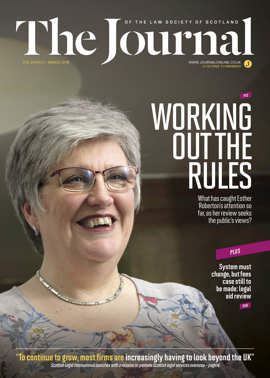Please can we have some more?

Sweeping proposals to reform the legal aid system in Scotland have been made in the report of the independent review under Martyn Evans – but it turns away calls for an immediate overall increase in fees.
“I found, rather to my surprise, that the Scottish legal aid service compares very well internationally,” Evans writes in his foreword, while adding: “That finding should not lead to any complacency.”
After considering four possible approaches – retrench and reduce services; restructure and organise services in a different way; reform and focus on improving delivery; or rethink and develop a completely new approach – he concluded, “along with many of those who provided evidence, including the Law Society of Scotland, that we need a fundamentally new approach”.
Strategy points
The report sets out six strategic aims:
- placing the voice and interest of the user at the centre;
- maintaining scope but simplifying the system;
- supporting and developing an effective delivery model;
- creating fair and sustainable payments and fees;
- investing in service improvement, innovation and technology; and
- establishing effective oversight.
A total of 67 recommendations are made to meet one or other of these aims.
To meet the first aim, third-sector advice sectors and local authorities should be included in strategic planning and delivery; a consumer panel should represent the interests of users; a solicitor reference group should be involved in court business planning; and public information programmes should be targeted at helping people deal with problems.
The second would involve balancing the rules on contributions and clawbacks more fairly between income and capital; a formal review of contact cases to consider how to resolve them within an reasonable time; availability of legal aid for group or multi-party actions; and looking at a “preferred supplier” list for outlays.
Public policy should meet effective delivery by a funded mix of demand-led and targeted assistance delivery models, including funded solicitors “embedded within third sector organisations who have a significant civil case workload”. Signposting services should be available to the public, and the in-court advice services extended across all sheriffdoms.
The fees review should include the actual incomes of legal aid lawyers and firms. Higher fees should be possible in designated geographical areas or types of law, in order to ensure access to services. Criminal fees should be a priority for review. Firms and advocates with a good track record of claims should be allowed quarterly payments in advance. Registered firms and advice services should be willing to take a minimum number of referrals. And Citizens Advice Scotland should be supported to provide an online service.
Savings achieved should be reinvested in service improvement and innovation, and all providers should be required to adopt an “any door will do” policy – referring callers to appropriate providers and offering to make an appointment.
Under the final heading, there should be a new Scottish Legal Assistance Authority with overall responsibility for delivery, and monitoring and quality assurance powers, as well as powers to adjust the delivery model. It should be required “to deliver changes to the system within a consultative, transparent and accountable process”, and lead efforts to raise public awareness of the system.
Not proven
In the remaining space available we take a closer look at Evans’s findings on fees, and initial reactions.
Anyone hoping for an unanswerable conclusion that legal aid fees need to be increased will have been disappointed. “I cannot recommend all the changes suggested to me. The key one being a general increase in legal aid fees, for which I could not find the evidence to justify,” Evans states in his opening summary.
“Really? You can’t have looked very hard,” solicitors might be tempted to respond. Yet the opposite is the case, if chapter 4 of the report is to be believed. “I tried hard to find persuasive evidence in the responses to the review that there should be a general increase in all legal aid fees,” Evans concludes. “I could not. A general increase would benefit some already very well-rewarded practitioners.”
But did the Society not report a year ago on detailed research into the profitability (or otherwise) of legal aid practices? (Journal, February 2017, 20.) Referring to its conclusions describing the hourly rate in relation to the living wage, the level of unpaid work and the low profitability of legal aid firms, Evans states: “The basis on which these assertions were made is hard to follow even on a very close reading of the report.” Unable to access the background data, “I was therefore restricted in my ability to assess the evidence.”
And as firms specialising in legal aid work were found to be slightly more profitable than those which also had private fee income, the report, while “an admirable attempt” by the Society to quantify commercial viability, had no strong evidential basis on which to conduct effective negotiations. “Indeed, the argument is severely weakened by its methodology, the low level of response, data analysis and the partial advocacy of its findings.”
Tactics questioned
Regarding the infamous 1992 rates still being paid, Evans notes that “The understanding at the time was that these detailed tables of fees would, in future, be increasingly rarely used.” The 1992 rate now applies to around 5% of income from criminal legal aid fees, and this is set to diminish further. Other fees have increased on a number of occasions.
He also records that the simplification, with less bureaucracy for solicitors, through the increased use of block fees, has generally been welcomed; that the falling crime rate has led to reduced demand for legal services, but oversupply of practitioners in some locations; and that changes in the justice system have had a further effect.
Evans is not blind to the profession’s concerns: “During the review I was struck by the extent of low morale expressed by the legal aid solicitors I met and also the lack of public recognition of the valuable work undertaken by those who deliver legal aid-funded services.” But though he accepts that solicitors feel undervalued, reforming the way fees are set will not in itself address this: “The Law Society of Scotland, as the professional organisation, has a critical leadership role. The way in which the profession views itself influences the way in which others view the profession.”
Thus he seeks a more evidence-based approach to fee reviews, one that he believes will help reduce the tension between the profession and the Government. There should be a timetable for regular reviews. At present the profession’s tactics are “losing the strategic argument with the public”, and its “evidence” is often “more akin to strong assertion with anecdotes”. Hence “My preference would be for an open tender process for each review” – a comment whose meaning is not entirely clear.
Alongside this, a mechanism should be established to pay a proportion of legal aid quarterly in advance to law firms and advocates with a good track record of claims over the previous two years.
Meanwhile, during 2018 there should be set up an evidence-based review of legal aid fees – to the outcome of which both sides would have to commit in advance – with actual incomes of legal aid lawyers and firms as part of the process. Criminal fees should have first priority.
A way forward?
Reaction from solicitors has been predictably mixed. “There are aspects of Mr Evans’ report that are to be welcomed by practitioners,” the Edinburgh Bar Association, which has led the withdrawal from the police station duty scheme, said in a statement. He had recognised the unduly bureaucratic and complex nature of the system, and its inability to adapt to legal change; he had acknowledged the value legal aid practitioners bring to the justice system and society at large. “The fact that the Crown Office & Procurator Fiscal Service have observed that the complexity of the criminal legal aid arrangements are a significant hindrance to the development of a modern and effective criminal justice system is especially telling.”
It continued: “That having been said, it is of significant concern that, despite the resources and evidence available to Mr Evans, he could find nothing to persuade him that there should be an increase in legal aid fees. There are significant flaws in the methodology adopted by him and those flaws are readily identified.” For example, he identified that 96% of cases in the criminal courts were summary, but ignored the fact that, in real terms, solicitors now have to work for little over half what they were paid when summary fixed fees were introduced. “That Mr Evans did not consider this to be persuasive evidence in itself is troubling.”
And it warns that although the review identified that criminal legal aid fees ought to be a priority for the fees review, numbers at the Edinburgh criminal bar “have reached such a depleted level that we will now be conducting an urgent review in order to determine whether we can continue to offer the breadth of service which we have done until now”.
For the Society, Ian Moir, speaking following a meeting of the Legal Aid team, told the Journal that they welcomed the support for things they had been pressing for over a number of years, including simplifying the system, an independent fee review, and the proposals for expert fees involving direct payments by the legal aid authority to those on an approved panel. They were less clear as to the powers and purpose of the proposed new authority, and whether it would mean an improvement or might on the other hand reduce access to ministers when key policy matters fell to be discussed.
On fee rises, Evans’s comment on the profession’s tactics was met with the rejoinder “Everyone is entitled to their view.” Moir’s response to the finding that specialist firms appear to be more profitable, was: “It’s not my experience.” Moir certainly believes that a case can and will be made for increased fees, whatever approach any further review seeks, and on the basis of the report, wants that review to be set up with all speed. “I’m pleased to see that he’s recommended that it should be implemented, or at least the basis for bringing it forward should be resolved this year.”
The Scottish Government’s considered response was awaited at time of going to press. There will be much more to be said on this subject.
In this issue
- Borrowings, partner capital and profitability
- GDPR and the cloud
- Employment claims: is the flood still to come?
- Contributory fault: drivers, cyclists and pedestrians
- Reading for pleasure
- Opinion: Derek McCabe
- Book reviews
- Profile: Siobhan Kahmann
- President's column
- Application changes coming
- People on the move
- Seeking a better way
- Beyond borders
- Drawings and profitability
- Enforceable rights or progressive policy goals?
- Conflict theory: it works
- What the liquidators don't tell you
- The office on the move
- Please can we have some more?
- Health check for doctors' lines
- When creditors come first
- Keeping goods exclusive
- Tenant Farming Commissioner: the story so far
- HSE appeals: experts allowed in
- Scottish Solicitors' Discipline Tribunal
- Please don't stop the music
- Broadcasting's business end
- Public policy highlights
- Scam warnings escalate
- This time it's personal
- The game's not a bogey!
- "Only amateurs attack machines; professionals target people"
- When estate agents need client ID
- Banks, client accounts and the Money Laundering Regulations
- Third party rights: what now?
- Ask Ash






